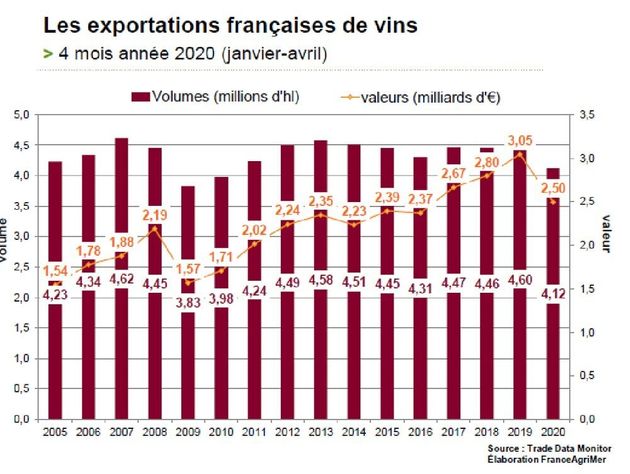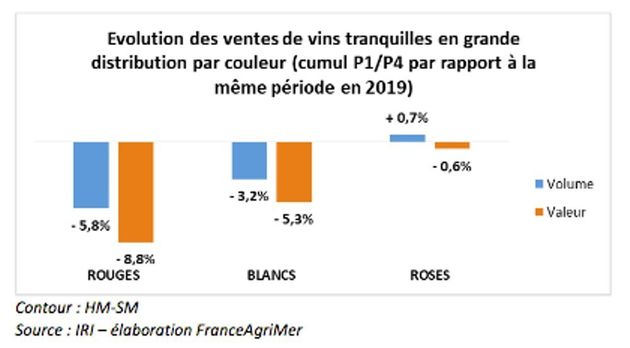Could the coronavirus be devastating to the French wine?
Global wine sales could fall by 13% in 2020 because of the coronavirus. Will the boom in online sales be enough to avoid the disaster?

Demonstrations and crisis in Hong Kong (a key hub for wines in Asia) in 2019, Brexit, US sanctions (Trump taxes) and now Covid-19. International trade news in recent months has been anything but boring, and the wine industry, which is highly export-oriented, is suffering the consequences.
The wine market has already experienced many crises and has proven to be resilient.
However, according to IWSR firm forecasts, global wine sales could fall by 13% in 2020 because of the current crisis. This would be a more severe effect than during the 2008 financial crisis.
READ ALSO – Summer sales in France: mixed results, as expected
These cyclical challenges create a great deal of uncertainty for the players, many of which are small and medium-sized exporters. They also aggravate some underlying structural difficulties that the operators were still managing to contain prior to Covid-19.
FranceAgrimer’s latest economic report (July 2020) confirms the downward trend in French exports over the first 4 months of 2020 (-16% in volume and -36% in value compared with April 2019) for all categories of wine. The drop is even sharper for Champagne.
Let’s recall France’s world ranking in 2019: 3rd largest vineyard area, 2nd largest producer and consumer, 3rd largest exporter in volume and above all 1st exporter in value, ahead of Italy and Spain.

Thus, the present state of affairs is, unfortunately, a real-life case of the impact on the export performance and health of wine companies. There is also a need to foster the revival of commercial relations and initiatives to develop and promote sales.
Given this unprecedented situation, an analysis was made of the content of 238 articles found using the search engine of Vitisphère, a portal for information, contacts and specialised services, dedicated to “vine and wine” professionals, over the period from 1 March 2020 to 26 July 2020.
The goal of the study was, through a dynamic approach, to draw up an inventory on the impact of the current health crisis on exporting companies in the French wine industry, but also to identify the initiatives and reactions of the actors regarding this crisis.
International and domestic wine sales at half-mast
As a direct consequence of the lockdown and closure of borders – from China in January to Europe in February-March and the American continent in March – international activity came to a standstill during this period. This is illustrated by the many postponements of international trade fairs until the summer of 2020 or even 2021.
These meetings are key moments for the commercial development of companies in the industry, and their postponements are a major barrier to their international activity, even though innovative initiatives have been developed with online trade shows. But These postponements are synonymous with reduced cash flow and missed opportunities to develop and sustain networks with French and foreign customers.
READ ALSO – Covid-19: Massive losses for French tourism, but there’s some hope
Another sign of the decline in international activity is the freeze in the logistics chain, with saturated seaports and airports.
Also, the confinement and closure of borders have meant that the movement of commercial resources, particularly for exports, has been replaced by the shift to teleworking, to maintain trade relations at a distance.
Besides this standstill at the global level, the health crisis has led to a drop and a change in consumption on the domestic market. For example, spring wine fairs in supermarkets have failed, and cafés, hotels, restaurants and enotourism have suspended their activities.

FranceAgrimer’s economic report confirms the decline in the number of protected designations of origin, the persistence of protected geographical indications and the sharp rise in the number of so-called “bag-in-box” (wine fountains).
A sharper decline is expected in the high-end segments, primarily for the closure of cafés, hotels, restaurants and social events prevented by the lockdown. However, the effects on the actors of the sector are mixed, depending on two elements: the dependence level on these channels and the situation of the production region before the crisis.
In fact, private wineries seem to be more affected than cooperatives. This is due to their heavy dependence on cellar sales, cafés, hotels, restaurants and wine tourism, on top of the slowdown in exports.
In addition, in Bordeaux for example, this crisis has further increased the difficulties encountered by the sector which has been experiencing a slowdown in domestic and Chinese consumption for the past two years. It is also already facing structural overproduction because of the changing demand for wine profiles and the environmental shift to be made, not to mention the many climatic hazards of this year 2020.
READ ALSO – French cereal production figures to drop this year
Rise of online sales
As early as the beginning of March, journalists were already speculating that some consumption lost abroad would be carried over to the domestic market and that e-commerce would be an opportunity (a trend confirmed by the IRI company study showing a 179% increase in online sales in March-April).
This lockdown was an opportunity for some winegrowers to innovate and launch their online sales website, allowing certain shipments to be made in France and Europe. Others have launched home delivery or “click and collect” at the winery.
We can see the same upward trend in auctions. For example, in Hong Kong (the world’s leading online wine auction market), an increase in online sales was observed as early as March 2020, replacing live auctions. It remains to be seen whether these trends will continue to develop in the coming months.
Surplus stocks are a cause for concern
A major reason for the decline in sales outlets for wine in France and abroad is the surplus stocks (estimated at 3 million hectolitres by the wine industry).
Stocks are unavoidable in the operating cycle of companies in the sector and contribute majorly to cash flow requirements.
Drop in sales, lower yields, climatic hazards, all these elements upset the balance of the sector’s players in terms of stocks. Today we can see how important this is for the sustainability of these companies.
Therefore, the entire sector has mobilised the European Union, the French government, the regions and also the banks over the last five months to secure aid and measures to manage these surplus stocks, with the 2020 harvest in mind, for which storage capacity must be freed up.
Le gouvernement va procéder à des exonérations de cotisations sociales pour les TPE et PME du secteur viticole les plus en difficulté et met en place un dispositif de distillation de crise de 140M€. Au niveau européen, nous renouvellerons notre demande d'un fonds de compensation pic.twitter.com/ZY367nGPK6
— Bruno Le Maire (@BrunoLeMaire) May 11, 2020
Crisis distillation and private storage were at the heart of the talks. Besides requests for exemptions from charges for loss of activity or aid for promotion and marketing.
The fact remains that actors and regions do not all have the same needs in terms of help. For example, the Bordeaux and Languedoc regions have a greater need for distillation (they account for 60% of requests) than regions such as Champagne, Burgundy or Alsace.
Further steps are under consideration. Among them, individual supplementary volumes, the interprofessional reserve and the possibility of increasing the proportion of the 2019 vintage in 2020.
In view of climate change and the likelihood of further crises in the future, it seems essential to consider a toolbox for managing these downward variations (in the event of low harvest, for example), and the increase in wine stocks, which fluctuate the financing needs and operational risk of companies and threaten their sustainability.
This framework will have to take into account the diversity of situations and the profiles of the actors involved. Because this crisis shows us once again that the wine sector has many faces and that a unique and generalised solution is not appropriate.
Last, if for some the current crisis has allowed showing solidarity (donations of alcohol for manufacturing hand sanitizer gel, charity sales, promotion of enotourism), the period represents above all an opportunity to reflect on the future, strategy and business projects.
To bounce back, the wine industry players have no choice but to draw the consequences of the trends revealed during the crisis. These include corporate social responsibility, online sales and the development of the “Bag-in-box” in the restaurant and catering network to reduce the carbon footprint; these are just some challenges to be taken up in this period of uncertainty for the French wine industry and its sustainability.